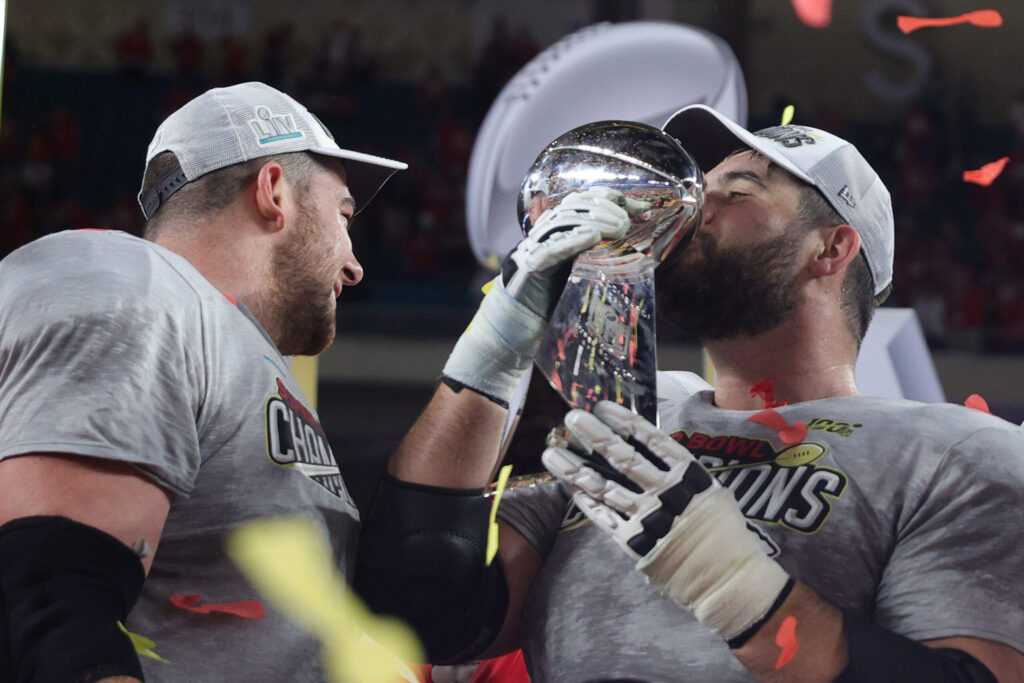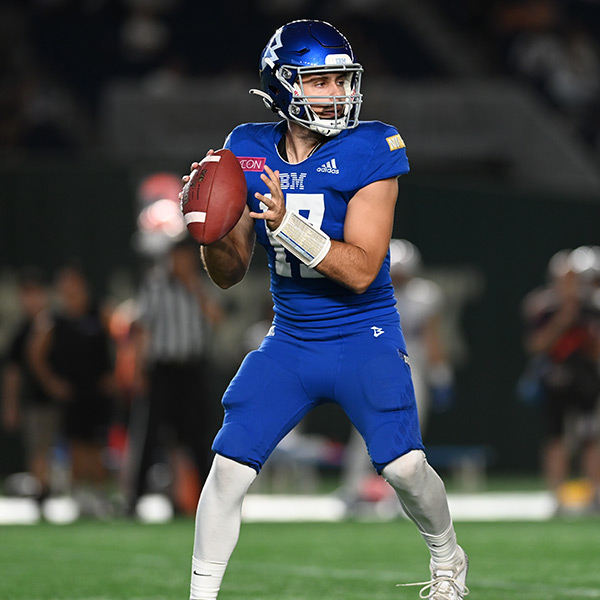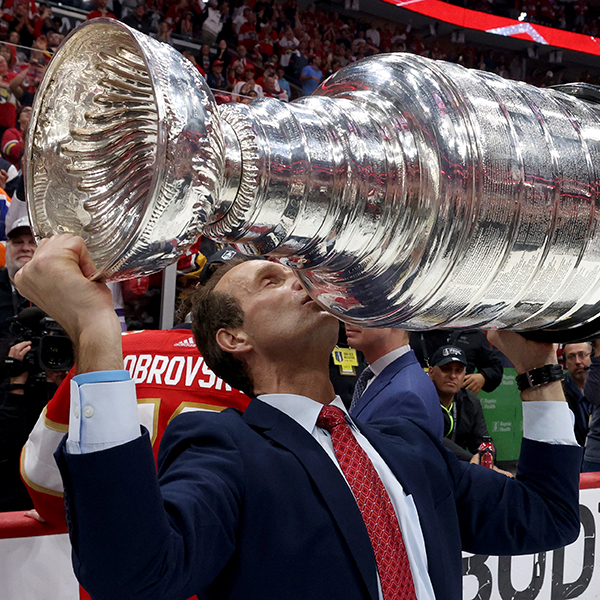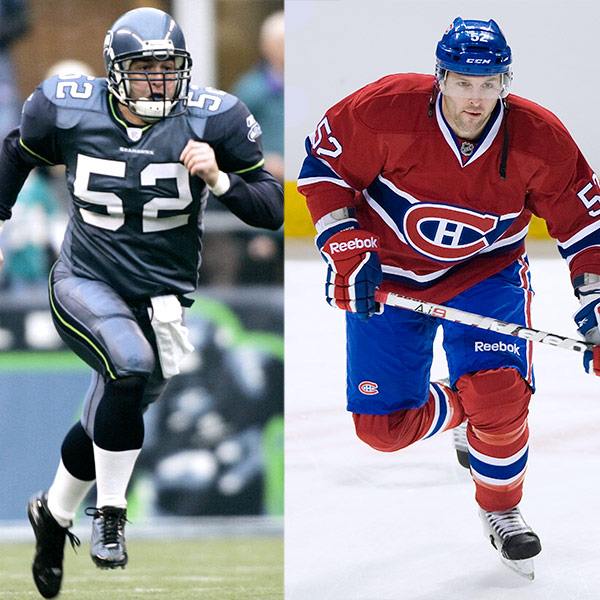Just as summer turns to fall, Laurent Duvernay-Tardif, MDCM’18, would, every year, suit up for the football season. It would typically begin with training in 30-degree weather and finish with a final game in below-zero conditions.

“The last time I wasn’t playing football at this time of the year was when I [spent a year] sailing with my family when I was 15 or 16,” the 29-year-old said on a recent conference call with the media.
But this has not been a normal year. Not for anyone – and certainly not for Dr. Laurent Duvernay-Tardif.
The first part of 2020 was a dream come true for the McGill medical graduate. The burly offensive guard and his Kansas City Chiefs teammates went unbeaten in the NFL playoffs, winning the Super Bowl on February 2 and hoisting the Vince Lombardi Trophy as the NFL’s champions.
TV cameras caught Ant-Man star Paul Rudd and his son (wearing a Duvernay-Tardif jersey) celebrating with Duvernay-Tardif on the field immediately after the victory. Later, Duvernay-Tardif would confess that he hadn’t realized that Rudd was a famous actor – he thought his friend Paul was simply an enthusiastic fan who somehow managed to turn up in the Chiefs’ locker room a lot.
Later that month, Duvernay-Tardif was presented with the Medal of Honour of the National Assembly in Quebec City. As the MNAs all rose to applaud the Super Bowl champion, Premier François Legault joked that it marked a rare occasion where representatives from all of the province’s political parties could unanimously agree on something.
Several weeks later, Duvernay-Tardif’s life was very different.
In the spring, he was regularly suiting up in PPE (personal protective equipment) and helping to guard the front lines of the COVID-19 pandemic in a long-term care facility on Montreal’s South Shore.
Duvernay-Tardif spent nine weeks assisting the facility’s overworked staff. He drew blood, inserted catheters and crushed up medicine for his elderly charges, but he also moved beyond medical tasks.
“I started using my phone to FaceTime with the family of each patient. Many relatives burst into tears. Connection, real connection, became part of my job description,” he recounted to writer Greg Bishop in a recent first-person piece in Sports Illustrated, describing the seminal experience. “It changed my whole approach to medicine, influencing how I’ll be as a doctor in the future.”
One of only four medical graduates to ever play in the NFL, Duvernay-Tardif came to the realization that, faced with a dangerous and unpredictable pandemic, he would have to make a choice between his two passions – at least for now.
“For me, from a public health perspective, you realize that you were potentially going to put other people at risk by your interactions with your team, your travel, game day. That was something I was struggling with,” he said at the press briefing. His words now seem prophetic. Weeks later, the Tennessee Titans’ season was disrupted when more than 20 members of the organization tested positive for COVID-19.
While Duvernay-Tardif believes that the NFL has done its best to be responsible in its safety protocols – he even played a role in the planning for them as a member of the NFL Players Association’s COVID-19 task force – he still had misgivings. What gave him pause was the physical nature of his sport and how easily the virus could spread between players and the people they would regularly encounter – hotel staff, for instance, who would then go home to their families.
Duvernay-Tardif became the first NFL player to opt out of the 2020 season, taking advantage of a player-negotiated clause and clearing a path for nearly 70 other players who have followed his lead.
“I understand the role that sports play in society. I get the need for games to serve as bonding exercises that rally people together in the worst times,” says Duvernay-Tardif. But he feels he needs to focus his energies elsewhere right now.
Matthieu Quiviger, BSc’94, BArch’95, was one of Duvernay-Tardif’s coaches on McGill’s football team. The two became close friends. “[Laurent is] saying, you know I may get [the virus], but if I do, it’s going to be in my community and in trying to help out others.”
Duvernay-Tardif has decided to continue to work in long-term care for two days a week and has begun taking online courses at the T.H. Chan School of Public Health at Harvard University. He says these studies bring together his medical knowledge, his experience with the media and the philanthropic goals he’s been trying to achieve with his child-centred Laurent Duvernay-Tardif Foundation.
In January, he’ll begin a master’s program in public health that will include classes in health and social behaviour, nutrition from a global population standpoint, biostatistics and epidemiology. “For me, it was important to get into a program that would advance my medical curriculum and contribute to the front lines.”
“He’s a very bright guy and very motivated,” says Dr. Jean-Philippe Darche, BSc’97, a team physician for the Chiefs. “He’s not somebody who’s too concerned about what anybody’s thinking or how his opinion is going to be received. If he believes in something, he’s just going to do it.”
Still, Duvernay-Tardif was relieved when he saw how his Chiefs teammates and coaches responded to his decision.
“I’m a huge Larry Duvernay-Tardif fan,” Kansas head coach Andy Reid told a news conference. “I also was raised by a doctor” – his mother Elizabeth was a McGill medical graduate – “so I understand the dedication that it takes to be a doctor. The veteran players support him, and the coaches support him. We know … when the football is over, this is going to be one of the best doctors ever.”
Associate professor of pediatrics Preetha Krishnamoorthy, MDCM’96, supervised Duvernay-Tardif during his pediatrics internship. She isn’t surprised by his decision. “I do think that’s how things happen in life and in medicine: it’s your experiences that make you decide and might make you change your path.” Dr. Krishnamoorthy laughs when she remembers how the NFL star was such a gentle giant among the preemies in the neonatal ward.
Darche says the decision not to play couldn’t have been easy for Duvernay-Tardif. As a former NFL player turned physician himself, Darche is one of the very few people who has experienced a similar career trajectory. Darche retired from the NFL because of injuries. Walking away from the playing field was tough, he says.
“You won’t find anything in the real world that will match that kind of emotion, that kind of intensity.”
Duvernay-Tardif was drafted by the Chiefs after he had established himself as one of Canada’s top football prospects during his time at McGill. He earned the J.P. Metras Trophy as the most outstanding lineman in Canadian university football.
“This guy’s the toughest human being ever,” says Quiviger. “Plus he’s got flexible hips [and] flexible ankles. He could run and he could tackle and not get easily tackled. I knew he was going to be phenomenal.”
Duvernay-Tardif admits he misses the NFL. “At the end of day, I did what was right for me, personally. It’s a sport that I love and want to play, but on the other hand I want to make sure that five to 10 years from now I’m comfortable with the call I made, and comfortable that I followed my conviction and saw the bigger picture.”
He is cheering for the Chiefs this year. “I want my team to repeat as Super Bowl champions,” he told Sports Illustrated, “so that when I do return, we’re zoned in on a rare NFL three-peat.”


